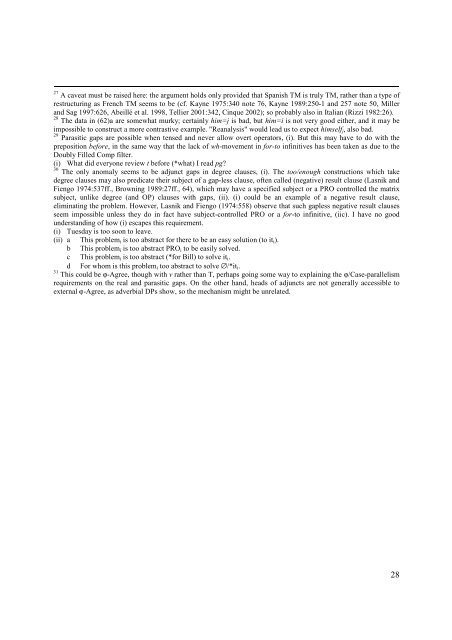1 On tough-movement* Milan Rezac, University ... - Multimania.co.uk
1 On tough-movement* Milan Rezac, University ... - Multimania.co.uk
1 On tough-movement* Milan Rezac, University ... - Multimania.co.uk
Create successful ePaper yourself
Turn your PDF publications into a flip-book with our unique Google optimized e-Paper software.
27 A caveat must be raised here: the argument holds only provided that Spanish TM is truly TM, rather than a type of<br />
restructuring as French TM seems to be (cf. Kayne 1975:340 note 76, Kayne 1989:250-1 and 257 note 50, Miller<br />
and Sag 1997:626, Abeillé et al. 1998, Tellier 2001:342, Cinque 2002); so probably also in Italian (Rizzi 1982:26).<br />
28 The data in (62)a are somewhat murky; certainly him=j is bad, but him=i is not very good either, and it may be<br />
impossible to <strong>co</strong>nstruct a more <strong>co</strong>ntrastive example. "Reanalysis" would lead us to expect himself j , also bad.<br />
29 Parasitic gaps are possible when tensed and never allow overt operators, (i). But this may have to do with the<br />
preposition before, in the same way that the lack of wh-movement in for-to infinitives has been taken as due to the<br />
Doubly Filled Comp filter.<br />
(i) What did everyone review t before (*what) I read pg?<br />
30 The only anomaly seems to be adjunct gaps in degree clauses, (i). The too/enough <strong>co</strong>nstructions which take<br />
degree clauses may also predicate their subject of a gap-less clause, often called (negative) result clause (Lasnik and<br />
Fiengo 1974:537ff., Browning 1989:27ff., 64), which may have a specified subject or a PRO <strong>co</strong>ntrolled the matrix<br />
subject, unlike degree (and OP) clauses with gaps, (ii). (i) <strong>co</strong>uld be an example of a negative result clause,<br />
eliminating the problem. However, Lasnik and Fiengo (1974:558) observe that such gapless negative result clauses<br />
seem impossible unless they do in fact have subject-<strong>co</strong>ntrolled PRO or a for-to infinitive, (iic). I have no good<br />
understanding of how (i) escapes this requirement.<br />
(i) Tuesday is too soon to leave.<br />
(ii) a This problem i is too abstract for there to be an easy solution (to it i ).<br />
b This problem i is too abstract PRO i to be easily solved.<br />
c This problem i is too abstract (*for Bill) to solve it i .<br />
d For whom is this problem i too abstract to solve ∅/*it i .<br />
31 This <strong>co</strong>uld be φ-Agree, though with v rather than T, perhaps going some way to explaining the φ/Case-parallelism<br />
requirements on the real and parasitic gaps. <strong>On</strong> the other hand, heads of adjuncts are not generally accessible to<br />
external φ-Agree, as adverbial DPs show, so the mechanism might be unrelated.<br />
28
















